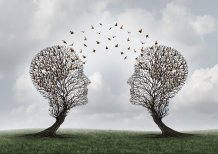Articles

Relating well to others and having good emotional control are key to mental well-being
Mental Well-Being Related to Better Brain Health in Older Adults
A positive sense of mental well-being is related to better brain health among older adults, according to a new report issued today by the Global Council on Brain Health (GCBH) and involving University of Exeter research.
Studies shows our sense of mental well-being tends to increase after middle age and there are steps we can take to help improve it, regardless of age.
Mental well-being is defined as a person’s experience of feeling good, functioning well, and coping adequately with life’s challenges. Functioning well means being able to think and reason sufficiently to conduct daily activities, but also the ability to function socially with others and to cope with life’s challenges.
Professor Linda Clare, of the University of Exeter, conducts research that fed into the report and is also vice-chair of the governance committee for GCBH. She said: “Regardless of your age and physical health, we can all take action to improve our mental well-being. Measures such as getting enough sleep, improving our relationships and interaction with family and friends and getting the right kind of exercise can all help. We now know that this is linked to better brain health in older age – and we need to explore whether it can actually reduce our risk of developing dementia.”
“Many things can affect our sense of mental well-being, like our genetics, personality, life experiences, environmental factors and our personal relationships,” said Sarah Lenz Lock, AARP Senior Vice President for Policy, and GCBH Executive Director. “But mental well-being is something that we can improve and maintain as we age by living a healthy lifestyle, learning how to manage stress and anxiety, and engaging in things that give us a sense of purpose.”
Consensus Statement
Based on the available evidence, the GCBH says that:
- Greater mental well-being is associated with reduced risk of dementia.
- Multiple medications taken together can negatively affect mental well-being and cognitive health.
- It is possible to improve your sense of mental well-being, regardless of age or physical condition.
- Relating well to others and having good emotional control are key to mental well-being.
The GCBH experts recommend a variety of activities that can help people preserve a positive sense of mental well-being. A few of these activities include: strengthening relationships with family and friends, getting regular exercise, finding ways to relieve mental and physical stress, regularly reviewing your medications and their interactions that may be clouding your thinking and feelings, and getting 7 to 8 hours of sleep each night.
Useful Tips
Here are just a few specific practical tips the GCBH offers that people can do to help improve and maintain their sense of mental well-being:
- Find things that make you laugh, such as humorous movies, books, or online videos. Laughter relieves stress, reduces tension and anxiety, and even lessens pain.
- Take deliberate breaks from social media, by avoiding smart phones during meals, for instance.
- Establish meaningful connections with people in your community, such as your neighbours.
- Become a regular volunteer. Volunteering helps provide a sense of purpose in life, which may ward off anxiety, depression, loneliness, and social isolation.
“The GCBH provides you strategies to relax and optimize your mental well-being,” said Lock. “Learning how to cope well with life’s challenges can help optimize your brain health and help you stay sharp as you age.”
Date: 10 October 2018
